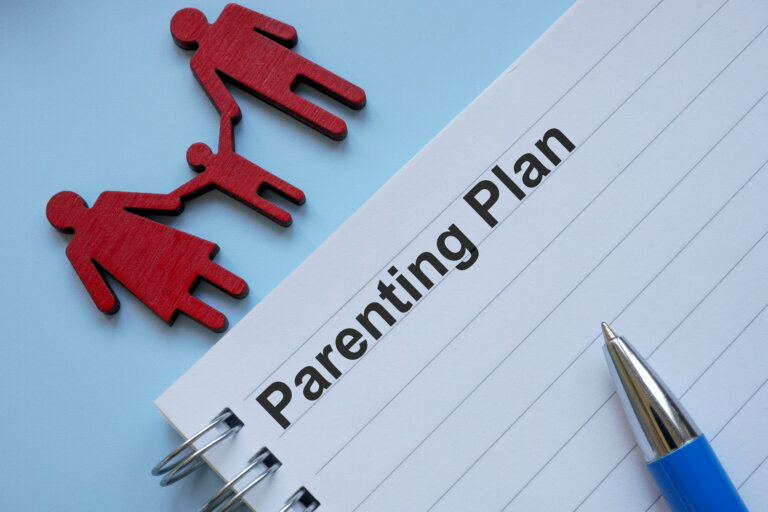What Is a Parenting Plan?
A parenting plan is a written agreement that outlines how separated or divorced parents will care for their child. In Arizona, it’s a required part of any custody order involving legal decision-making or parenting time. The plan becomes part of your court order, which means it’s legally binding and enforceable.
At its core, a parenting plan is meant to give your child a consistent routine and a sense of security. It details how decisions will be made, where the child will live, and how parents will share responsibilities: the more thorough the plan, the fewer surprises and conflicts down the road. Given the challenges of negotiating a divorce, working with an experienced family law attorney is the best way to create a parenting plan that meets your family’s needs.
Why a Good Parenting Plan Matters
A well-thought-out parenting plan does more than check a legal box—it helps families avoid confusion, reduce conflict, and provide a stable environment for children after divorce or separation. When expectations are clearly defined, everyone involved can focus less on disagreements and more on meeting the child’s needs.
Without a solid parenting plan, misunderstandings can quickly lead to tension. For example, if one parent assumes they can make medical decisions alone or change the holiday schedule on short notice, that can spark unnecessary disputes. A clear plan prevents these issues by spelling out:
- Who makes decisions about health care, education, and religion
- How holidays, school breaks, and vacations are divided
- What the daily and weekly parenting time schedule looks like
- How parents will communicate about the child
Children benefit most when both parents are consistent and cooperative. A strong parenting plan helps make that possible, especially when emotions are still high or communication is strained. It can also be a helpful guide as your child grows, giving you a framework to adjust terms as needed.
In short, a good parenting plan supports your child’s well-being while reducing the risk of future legal battles between parents.
How to Make a Parenting Plan
Creating a parenting plan can feel overwhelming at first, but breaking it down into smaller steps makes it manageable. The key is to focus on clarity, consistency, and what’s best for your child. Below are some key considerations to guide your plan.
Choosing Words Carefully
The language in a parenting plan must be concise. Vague terms like “reasonable time” or “as agreed” may seem flexible, but they can lead to confusion later. Use specific, clear language for schedules, responsibilities, and expectations, for example, instead of saying “alternate weekends,” list exact times and days. The goal is to reduce the chance of misinterpretation.
Tailoring to the Child’s Needs
No two families are the same, and your parenting plan should reflect your child’s age, temperament, school schedule, and other specific needs. Younger children often do best with frequent, shorter visits, while older kids may prefer fewer transitions. Think about their routines, emotional development, and how changes might affect them. Your plan should grow with your child, not box them in.
Communicating About Your Parenting Plan
Even with a detailed plan, communication is critical. Decide how and when you’ll share information, whether through phone calls, text, or a co-parenting app. Set expectations for how quickly you’ll respond to each other and how you’ll handle changes. A parenting plan isn’t just a document—it’s a tool to support your ongoing collaboration as co-parents.
By approaching your parenting plan thoughtfully and with your child’s best interests in mind, you’re laying the groundwork for a healthier co-parenting relationship. A little planning now can prevent a lot of stress later for everyone involved.

Required Parenting Provisions
Under Arizona law, every parenting plan must include specific provisions that address the key aspects of raising a child after divorce or separation. These aren’t just formalities—they’re the foundation of your custody agreement and ensure both parents understand their rights and responsibilities.
Legal Decision-Making
This section explains who has the authority to make significant decisions for the child, including those related to health care, education, and religious upbringing. Parents can share joint legal decision-making, or one parent may have sole authority. The plan should make this clear to avoid disputes later.
Medical and Dental Care
Your parenting plan should specify how routine and emergency medical and dental care will be handled. Will both parents attend doctor appointments? Who will carry health insurance? How will you share costs? Spelling this out in advance helps prevent confusion during a medical crisis.
Education and Extracurricular Activities
This provision should state where the child will attend school, how school-related decisions are made, and how parents will handle extracurricular activities. It’s also a good place to clarify transportation responsibilities and participation expectations for both parents.
Religious Participation
If religion is a factor in your child’s life, your plan should note which parent is responsible for religious decisions or if they will be shared. It can also include guidelines on attendance at services or involvement in religious education.
These required provisions serve as the legal backbone of your parenting plan. Once these essentials are in place, you can tailor your parenting plan to your family’s unique needs and circumstances.
Recommended Parenting Provisions
While Arizona law only requires certain provisions in a parenting plan, adding recommended terms can make your plan more effective and easier to follow. These provisions help cover everyday situations that may not be obvious at first, but often lead to conflict if not addressed in advance.
Child-Rearing and Co-Parenting Guidelines
Think of this as a shared parenting philosophy. You can include general rules or expectations around bedtime, screen time, discipline, and schoolwork. This helps create consistency for your child between both homes and reduces friction between parents over daily routines.
Set clear expectations for how you’ll communicate about the child and how quickly you’ll respond. Will you use text, email, or a parenting app? Agreeing to respond within a set timeframe—like 24 hours—can keep things running smoothly and prevent misunderstandings.
Dispute Resolution
Not all disagreements require a trip to court. Including a process for resolving disputes, such as mediation or using a parenting coordinator, can save time and money. This also shows the court that both parents are committed to working through issues constructively.
Age-Based Rules and Changes
Kids grow, and their needs change. You can include provisions that account for this, such as adjusting parenting time once the child starts school or becomes a teenager. Setting expectations now can make transitions easier later.
Safety
If there are any known safety concerns, such as firearm storage, supervision around pools, or restrictions on third-party contact, include those details. These provisions help protect your child and show a proactive approach to safety.
Child Care
Clarify how child care will be handled. Will both parents use the same provider? Will family members be allowed to babysit? Addressing these issues now avoids surprises when one parent has to work late or travel.
Moving (Relocating)
Even if you’re not planning to move, it’s wise to include language about relocation. You can agree on how much notice is required, how far a parent can move without court approval, and how to adjust parenting time if relocation happens.
Expenses
Break down how you’ll handle shared expenses beyond basic child support, like school supplies, clothing, sports fees, or birthday parties. Specify how costs will be tracked and reimbursed. This avoids financial disputes and keeps things fair.
Including these provisions gives your parenting plan more structure and flexibility, addresses the day-to-day realities of co-parenting, and provides a roadmap when unexpected situations come up.

Required Statements
In addition to outlining custody and parenting time, Arizona law requires certain written acknowledgments to be included in every parenting plan. These statements reinforce each parent’s responsibilities and help the court confirm that both parties understand their obligations. Your parenting plan must include:
- A statement acknowledging the consequences of false reporting: Both parents must confirm they understand that knowingly making false claims to the court may result in legal penalties.
- A commitment to promote frequent and meaningful contact: Each parent must agree to support the child’s ongoing relationship with the other parent, unless contact would seriously endanger the child’s health or safety.
- A declaration that the plan was developed in good faith: This shows the court that both parties participated honestly and cooperatively in creating the parenting plan.
Including these statements ensures your plan complies with Arizona custody laws and demonstrates to the court that you are prioritizing your child’s well-being and acting in good faith.
Special Considerations
Every family is different, and a one-size-fits-all parenting plan doesn’t work for everyone. Some situations call for additional thought and planning, especially when distance or conflict is a factor. If your circumstances are more complex, these provisions can help ensure your plan remains workable and focused on your child’s best interests.
Long-Distance Parenting Plans
When parents live far apart, a plan that preserves the child’s relationship with both parents, despite the distance, is essential. This might include:
- Extended visits during school breaks and holidays
- Scheduled phone or video calls
- Guidelines for travel arrangements and who pays for transportation
- Flexibility for unforeseen travel issues
The goal is to create a structure that supports ongoing connection, even when regular weekly visits aren’t possible.
Addressing Parenting Conflicts
Some parents anticipate ongoing disagreements or have already experienced high-conflict interactions. In those cases, the parenting plan can include:
- Use of a parenting coordinator or third-party mediator
- Communication limits (e.g., only written communication through a co-parenting app)
- Specific consequences for failing to follow the plan
A detailed plan can act as a buffer, reducing the chances that personal conflict will affect the child. By addressing potential challenges now, you can prevent misunderstandings and give your child the consistency they need.
Enforcement of Parenting Plans
Once approved by the court, a parenting plan becomes a legally binding order. That means both parents are required to follow it—missed exchanges, last-minute changes, or refusal to communicate can all lead to legal consequences if one parent isn’t complying.
If the parenting plan is being violated, the other parent can ask the court to enforce it. Common enforcement tools include:
- Filing a petition to enforce parenting time
- Requesting makeup parenting time for missed visits
- Asking the court to modify the plan if one parent repeatedly violates it
- Requesting attorney’s fees if the court finds the violation was unreasonable
In serious cases, the court may even impose fines or find a parent in contempt. If you’re experiencing repeated issues, it’s best to document violations and speak with a family law attorney. The sooner you address it, the better for you and your child.
How Cohen Family Law Can Help You Create a Parenting Plan
At Cohen Family Law, we know that parenting plans are more than just paperwork—they’re about protecting your relationship with your child and building a framework that works in real life. We take the time to understand your family’s dynamics, your goals, and your concerns, so we can help you create a plan that’s clear, fair, and built to last.
Whether you’re starting from scratch, modifying an old agreement, or trying to enforce an existing plan, we’ll guide you through every step. With decades of experience handling custody matters in Arizona, we know what courts expect and how to craft a plan that fits your unique needs. You can rely on us to help you make confident, informed decisions that support your child’s well-being—now and into the future.
Talk to Our Arizona Family Law Attorney About Your Parenting Plan
A well-conceived parenting plan can make a difficult situation more manageable for you and your child. It provides structure, reduces conflict, and helps everyone move forward with clear expectations.
Whether you’re preparing for your first custody agreement or need to make changes to an existing one, having the proper legal support makes all the difference. At Cohen Family Law, we’re here to help you build a parenting plan that works in the real world. Contact us today to secure your family’s future.


